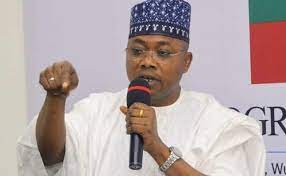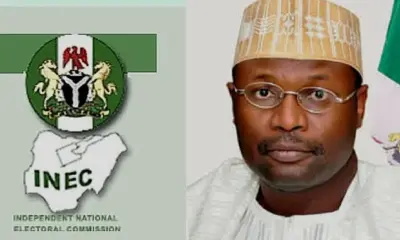Opinion
Do Nigerians want direct primary in elections?

By Mon-Charles Egbo
Since the inception of this republic, the major index reflecting Nigeria’s stunted democratic growth is her faulty electoral system. There is a consensus that unless the electoral processes are restructured for viability, meaningful political development, particularly in the area of virile leadership, will continue to elude the country. Then broadly, it is only when Nigeria gets her leadership recruitment processes right that the right leaders will emerge which in turn makes every other thing fall in place towards all-around development.

This gap has become such endemic that every election cycle has always offered justifiable bases for urgent tinkering of the processes. And as a result, every successive administration up to the present has made deliberate efforts at reforming Nigeria’s electoral system. Equally, every national assembly of course has continued to identify with this noble aspiration.
One remarkable intervention that climaxed the agitation at one time was when late Umaru Musa Yar’adua shortly after assuming office as the president, shocked the world with his sincere open admission that the very election that brought him to power was highly-flawed and for-which he called for urgent and drastic remedial measures.
Though these challenges are multi-faceted, the sustained clamours for deepened internal democracy for political parties and then enhanced integrity of the ballots have remained more profound. The greater percentage of Nigerians are unanimous that these two factors propagate political corruption and leadership deficit in the country.
Thus the 9th national assembly under Senator Ahmad Lawan slated electoral reform as one critical task that must be accomplished in this dispensation for Nigeria to recover lost grounds and ultimately experience the next level of socio-economic prosperity. Lawan has been consistent that “we will be quick to address all the grey areas and come up with better inputs before the next general elections. We consider our elections of great importance; we have lessons to learn and we want our elections to be credible. Our desire is that our electoral umpire continues to be independent and improve to perform the statutory functions creditably well. We, in the ninth assembly, will continue to work in a committed and united manner to offer the best to the electorate”.
Apparently, in hindsight, he was emphatic that “we want to pass the Bill well ahead of the next electoral cycle in 2023 and avoid the political heat and pitfalls that imperilled the efforts of the eight National Assembly which passed the same bill close to the last general elections”.
Certainly, those were not rhetoric. An objective analysis of the trajectory shows that the 9th assembly is resolute on this course of action.
But quite sadly, certain actions and inaction of the past federal parliaments, prevailing economic hardship in the country, and above all, poor knowledge of the actual roles and responsibilities of the legislature, have cumulatively visited on the 9th national assembly a huge dose of public apathy and hostility. Hence, the quantum of the orchestrated propaganda and lies against it has seemingly overshadowed every sincere effort made by the 9th national assembly.
Sequel to prejudice, not many recognize that the 9th assembly in deference to the wishes of the people when it mattered most settled for the electronic transmission of election results as well as broader deployment of technology in electoral processes. Yes, the people stood to be counted, individually and as groups. This they did through constructive engagements with their statutory representatives. And then living up to its billing as a people-oriented parliament, the Lawan-led national assembly respected and upheld the collective expectation of the masses.
The lawmakers did not stop there. Perhaps in a bid to compensate for the ‘pains’ that it caused the people while the debate lasted, the 9th assembly introduced the strategic provision for a direct primary mode of selecting political party candidates. This means that instead of using delegates, party members at the ward levels and under the supervision of the independent national electoral commission, INEC, will have equal opportunities of choosing their flag-bearers. In other words, candidates are to derive their mandates directly from the members, irrespective of status which in itself is a clear test of popularity.
Expectedly and typical of democracy, this generated varying views. There are concerns about the possibility of over-stretching the capacity of the INEC in providing the necessary logistics for monitoring and supervision of party primaries across the country, the economic implications on the political parties as well as the integrity of the party registers and then the whole gamut of collating and transmitting the final results of the primaries into a protected central database.
Also, there is this valid argument that rather than undemocratically forcing the parties to adopt a uniform template, they should be allowed the latitude of choosing the model that suits their peculiarities. The state governors and a few other highly-placed Nigerians champion these positions.
Then conversely, there is a school of thought that favours the direct primary system. Among others, it takes power back to the people as parties and aspirants have to resort to the members for the mandate. Again, to fly a party’s flag, a contestant must have a direct engagement with the membership unlike when the delegate lists are largely manipulated against certain aspirants in favour of those preferred by the priviledged few. It is also argued that under the indirect primary mode, the state governors are emperors with limitless powers to determine the political future and fortunes of party members where they unilaterally choose candidates based on self-seeking considerations. And one of the unfortunate outcomes of this unpopular arrangement is the high turnover of legislators despite the resources expended in preparing them due to the desperation of state governors to decide who goes to the legislature at every election cycle.
Then above all, it would be recalled that what conferred on the June 12 1993 election the historical landmark status it enjoys was principally the manners in which the candidates emerged. The Option-A4 system of that era was a masterstroke. Just because the people were involved right from the basics, they were enthusiastic and determined to ensure that their expressed wills were sustained to the last. But for the unfortunate annulment, nobody would be talking about indirect primaries in Nigeria today.
Besides, it is simple logic that where your investment is located is certainly where your attention and interest lie, thus implying that any government that is formed by the people (and not for the people) naturally shall be accepted and supported by the people. So there is no better way to return powers to the people than making party members have a direct say in who becomes their candidates. This is the hallmark of democracy.
Hence, anybody that is opposed to the direct primary mode does not only encourage a system of leadership that is bereft of legitimacy but creates fertile grounds for the propagation of emperors and demigods, where anyone without a political godfather has no place in our politics. It is only the unpopular politicians who are not grounded but are foisted on the people that justifiably should fault direct primaries. Otherwise, the same quantum of state resources that governors usually deploy to railroad their descendants to offices should be judiciously utilized in providing the needed logistics towards making the votes of party members count in the nomination of candidates. That is a major way to evolve sustainable home-grown democracy in Nigeria.
Meanwhile instructively, there is a compelling sentiment that the issue of direct or indirect primaries might undermine and or waste all the successes recorded in the overall amendment of the Electoral Acts, in a questionable manner of throwing away the bathwater with the baby, if the bill is not assented to by the President. This should not be taken for granted!
However, if Nigerians could rise in anger against an organized attempt to sabotage the implementation of the financial autonomy for the state legislatures and judiciary, it means that if the masses close ranks with the lawmakers, the collective will of the people will surely prevail once again. And also, it is noteworthy that even the direct primary system is slightly prone to manipulation, after all, it is driven by human beings. But eternal vigilance they say is the price of liberty!
Therefore despite possible shortcomings, the direct primary is better off than the indirect primary and consensus modes. With it, contestants will learn to recognize and respect the people as the ultimate lords and masters in politics. Also as laudable as it is, it will ensure diligence, fairness, equality, stability and sanity as public officials will now see the need to be accountable to the people. Again, it will guarantee that it is only people of character, competence and capacity are allowed access to public offices. And then, it will engender wider participation and inclusiveness in our democracy especially in favour of the youths and women including even the physically challenged.
Buoyed by all these, the 9th national assembly has responded to the yearnings of the people and gallantly demonstrated to every lover of democracy that with the deployment of electronic transmission of election results and adoption of direct primary mode, there would have been tremendous improvement in favour of future elections. As such President Muhammadu Buhari should seize this opportunity to stamp his dispensation as one that truly took the electoral process review to yet another landmark level. This bill has sufficient capacity to change the narratives for him and his government.
Nonetheless, the ball is in your court, the great people of Nigeria!
Egbo is the print media to the President of the Senate.

























